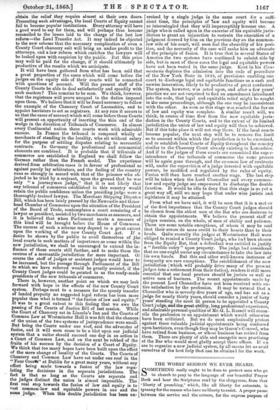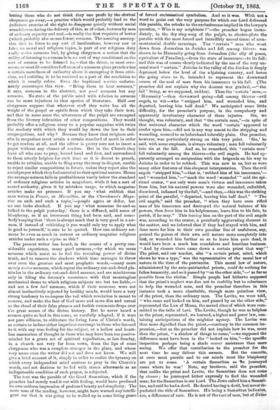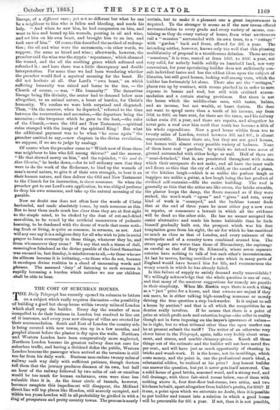THE WORST SERMON WE EVER HEARD.
SOMETHING really ought to be done to protect men who go to church to pray in the language of our beautiful Prayer Book and hear the Scriptures read by the clergyman, from that liberty of preaching,' which, like all liberty for autocrats, is tyranny for the masses who have no liberty to resist. A proper pause between the service and the sermon, for the express purpose of letting those who do not think they can profit by the clerical eloquence go away,—a practice which would probably lead to the judicious exercise of the right to disappear quietly without social scandal even during the delivery of this, as of other, lectures by men of ordinary rapacity and zeal,—is really the first requisite of better (which probably also means fewer) sermons. The amazing assump- tion that to listen to any sort of lucubrations, however raw or false, on moral and religious topics, is part of our religious duty really makes sermons bad, by giving clergymen a notion that the utility of listening to sermons is in no sort of way conditional on the sort of sermon to be listened to, —that the driest, or most erro- neous, or most ill-considered effusion of a common-place preacher has a certain sacredness of authority about it exempting it from criti- cism, and entitling it to be received as a part of the revelation to which it usually refers. Even the baptismal service unfortu- nately encourages this view. "Bring them to hear sermons," it says, sermons in the abstract, not good sermons but any sermons. No state of the public mind with relation to sermons can be more injurious to that species of literature. Half .oar clergymen suppose that whatever stuff they write has all the weight of the gospel or epistle from which they take their text, and that in some sense the utterances of the pulpit are exempted from the literary infirmities of other compositions. They would probably offer a religious essay to a popular magazine with twice the modesty with which they would lay down the law to their congregations, and why ? Because they know that religious arti- cles in magazines must attain a certain standard of merit in order to get readers at all, and the editor is pretty sure not to insert a paper without any chance of readers. But in the Church.they have all who care to pray, bound hand and foot, and surrendered to them utterly helpless for such time as it is decent to preach, unable to criticize, unable to fling away the essay in disgust, unable to reject similar compositions in future, unless they reject also the social prayer which theyfeel essential to their spiritual nature. Hence the average sermon falls in profitableness vastly below the standard of ordinary religious articles in magazines, while it has a sort of sacred authority, given it by mistaken usage, to which magazine articles make no pretence. If you say what rubbish that man writes in Fraser, or Macmillan, or the Churchman's Maga- zine on such and such a topic,'—people agree or differ, but no one looks shocked. If you say what nonsense So-and-so talked in the pulpit yesterday,' there is a diffused, mild sense of blasphemy, as if an irreverent thing had been said, and some- body's saying that there is always much that is very good in a ser- mon, if instead of criticizing it you would only try to apply what is good to yourself,' is sure to be quoted. How can ordinary ser- mons be even as much in earnest as ordinary magazine religious articles under such a regime as this ?
The present writer has heard, in the course of a pretty con- siderable experience, many good sermons,—by which we mean sermons which assist us to feel the revealing power of divine truth, and to remove the shadows which time manages to throw over even the greatest and most prophetic words,—many more merely useless sermons, which repeat the ordinary cut-and-dried pla- titudes in the ordinary cut-and-dried manner, and are mischievous only in filling the listener's conscience with that meaningless mechanical drone to which religious subjects are but too liable,— and not a few bad sermons, which if their nonsense were not almost instinctively rejected by healthy minds, would have a very strong tendency to re-impose the veil which revelation is meant to remove, and make the face of God more and more dim and unreal as the cloud of their false phrases and foolish comments drops over the great scenes of the divine history. But he never heard a sermon quite so bad in this sense, so carefully adapted, if it were not pure silliness, to obliterate the living form of Christ's words, so certain to induce either impatient contempt in those who listened to it with any true feeling for the subject, or a hollow and heart- less mannerism of thought in those who may have been too passive- minded for a grave act of spiritual repudiation, as last Sunday, in a church not very far from town, from the lips of some clergyman who was a complete stranger in the place, and whose very name even the writer did not and does not know. We will give a brief account of it, simply in order to realize the tyranny on which every independent mind anxious to pray in the Church's words, and not anxious to be fed with stones afterwards as an indispensable condition of such prayer, is subjected.
The text was the parable of the Good Samaritan, which if the preacher had merely read it out with feeling, would have produced its own uniform impression of profound beauty and simplicity. The mere tone of the reading, however, might have warned anyintelli- gent ear that it whs going to be walled up in some living grave of forced ecclesiastical symbolism. And so it was. With not a word to point out the very purpose for which our Lord delivered this parable, the rebuke to the exclusiveness implied in the Lawyer's question, " Who is my neighbour ?"—the preacher began imme- diately, in the dry sing-song of the pulpit, to electro-plate the parable with the most forced and incredibly unreal tissue of com- rnentatorial doable meanings. The " certain " man who went down from Jerusalem to Jericho and fell among thieve; was shown to be Humanity going from Jerusalem (the city of peace, equivalent of Paradise),—from the state of innocence—to its fall: and this was of course clearly indicated by the use of the very un- usual word " certain." Jericho in the valley of the Jordan is deeply depressed below the level of the adjoining country, and hence the going down to it, intended to represent the downward course of the soul of man from his innocence to his fall. (The preacher did not explain why the descent was gradual, —" the fall " being, as we supposed, sudden). Then the certain ' man,— 'Humanity Humanity'—thus downward going—fell among thieves —evil angels, to wit—who " stripped him, and wounded him, and departed, leaving him half dead." We anticipated some little difficulty, for the preacher's purpose, in the compulsory and apparently involuntary character of these injuries. Sin, we thought, was voluntary, and that "the certain man,"—in spite of that universal character which the word certain' appeared to confer upon him,—did not in any way assent to the stripping and wounding, seemed to us beforehand tolerably plain. Our preacher,
however, was particularly strong on this very point. Sin,' he said, with some emphasis, is always voluntary ; man fell voluntarily into sin at the fall. And so, he remarked, this certain man' fell voluntarily among the thieves—the evil angels. He had ap- parently arranged an assignation with the brigands on his way to Jericho in order to be robbed. This was new to us, but so were many other features of this eloquent interpretation. Then the evil angels "stripped him,"—that is, 'robbed him of his innocence,'— and " wounded him,"—" mark the word wounded " said the spi- ritual orator, " not only were man's virtues and innocence taken from him, but his natural powers were also wounded, enfeebled, disordered, inflamed by the fall,"—and then,—this was the striking point of the parallel, " departed, leaving him half dead." " The evil angels," said the preacher, " when they have once rifled man of his innocence and destroyed the natural balance of his powers, then leave him in his helplessness, leave him to his fate, to perish, if he may." This leaving him on the part of the evil angels was, according to the orator, a peculiarly aggravating element in the matter, and we inferred that if they had stayed with him, and done more for him in their own peculiar line of usefulness, say, poured the poison of their own evil nature more completely into hint, or wounded him further so as to leave him quite dead, it would have been a much less scandalous and heartless business. ".and by chance there came down a certain priest that way." The priest, said our teacher, also " a certain priest, mind, which shows he was a type," was the representative of the moral law of nature in the time of the patriarchs. This moral law of nature, administered by the ante-patriarchal priests, could do nothing for fallen humanity, and so it passed by "on the other side,"—' as far as possible from the victim.' Simple people had hitherto supposed that the priest's neglect was due not to inability but to reluctance to help the wounded man, and the preacher therefore in this instance took a more charitable, though more pointless view, of the priest, than the ordinary man. The Levite, we were told, "'who came and looked on him, and passed by on the other side," represented the Law of Moses, the sacred rites of which were com- mitted to the tribe of Levi. The Levite, though he was as helpless as the priest, represented, we learned, a higher and purer law, con- taining anticipations of the mightier agency. The Levite was thus more dignified than the priest,—contrary to the common im- pression,—but as the preacher did not explain how be was, more than the priest, " a shadow of things to come,"—we supposed the difference must have been in the " looked on him,"—the specific inspection perhaps being a shade nearer assistance than mere seeing. We offer that contribution to the preacher for the
next time he may deliver this sermon. But the conceits, at once most puerile and to our minds most like blasphemy are yet to come. "A certain Samaritan as "he journeyed came where he was.' Note, my brethren, said the preacher, that unlike the priest and Levite, the Samaritan does not come by chance ; he journeyed hither expressly to find the wounded man; for the Samaritan is our Lord. The Jews called him a Samari- tan, and said he had a devil. He denied having:a devil, but never re- pudiated the title of Samaritan. His being a Samaritan indicates, too, a difference of race. He is not of therace of man; but of divine lineage, of a deferent race ; yet not so different but what he can be a neighbour to him who is fallen and bleeding, and needs his help. " And when he saw him, he had compassion on him, and went to him and bound up his wounds, pouring in oil and wine, and set him on his own beast, and brought him to an inn, and took care of him." Of course this described the method of redemp- tion; the oil and wine were the sacraments,—in other words, we suppose, the same as bread and wine ; afterwards, however, the preacher said the wine was the styptic repentance,' which cleansed the wound, and the oil the soothing grace which softened and refreshed it : and here there was a little discrepancy and double interpretation. For some time we had been wondering whether the preacher would find a mystical meaning for the beast. He did not hesitate at all. Our Lord's " own beast," on which suffering humanity was raised and borne to the inn, — the 'Church of course, — was, " His humanity !" The Samaritan lineage being His divinity, the orator had to descend below man altogether, to an animal nature, a beast of burden, for Christ's humanity. We confess we were both surprised and disgusted. Then, " On the morrow, when he departed," referred to the time between the resurrection and ascension,—the departure being the ascension ;—the twopence which he gave to the host,—the ruler of the Church,—were the Old and New Testament,—spiritual coins stamped with the image of the spiritual King ! But what the additional payment was to be when " he came again " the preacher omitted to say,—new chapters in the divine revelation, we suppose, if we are to judge by analogy.
Of course when the preacher came to " Which now of these three was neighbour to him who fell among thieves?" and the answer, "He that showed mercy on him," and the rejoinder, " Go and do Attu likewise," he broke down,—for to tell ordinary men that they were to do the work of the Redeemer, to bind up the wounds of man's moral nature, to give it of their own strength, to bear it on their human nature, and then deliver the Old and New Testament to the Church for its instruction, is sheer nonsense. So when the preacher got to our Lord's own application, he was obliged perforce to drop his own nonsense, and take up the natural meaning of the parable.
Now no doubt one does not often hear the words of Christ beclouded, and made absolutely inane, by such nonsense as this. But to hear them made much less clear than they are at first sight to the simple mind, to be choked by the dust of cut-and-dried moralities, to be vexed by the artificial manoeuvres of pedantic learning, to be deadened with the drone of words that mean noth- ing fresh or living, is quite as common, in sermons, as not. And will any one say it is a religious duty for all who wish to join in social prayer to listen reverently to these things, whatever they be, and from whomsoever they come ? We say that such a tissue of dull, meaningless falsehood as the divine parable of the Good Samaritan -was encased in, last Sunday, is mischievous to all,—to those who see its silliness because it is irritating,—to those who do not, because it envelopes divine realities in a cloud of unmeaning words and phrases. The assumed 'duty' of listening to such sermons is rapidly becoming a burden which neither we nor our children shall be able to bear.
































 Previous page
Previous page